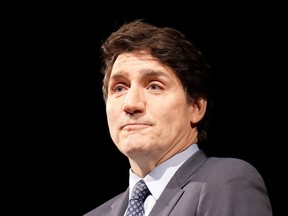Trudeau's two pensions worth $8.4 million, taxpayers federation estimates
'Taxpayers shouldn’t be on the hook for a second pension,' Franco Terrazzano says of extra stipend for heads of government
Although Justin Trudeau, 53, might be a couple of years away from choosing to draw from his federal retirement payouts, the former Canadian prime minister is estimated to earn $8.4 million in total from two pensions, the Canadian Taxpayers Federation says.
One to which all members of Parliament are entitled following six or more years of service and another for serving as prime minister.
Trudeau’s annual remuneration upon leaving office, according to Parliament, was $406,200 — $203,100 for the prime minister’s official salary and the same amount for the basic indemnity paid to all members of the House of Commons. (He also received a $2,000 annual vehicle allowance.)
As for his index-linked pension, using his highest-paying five years of his 17 in office, Trudeau’s will be calculated at three per cent, according to the Members of Parliament Retiring Allowances Act.
Provided he begins drawing upon his 55th birthday on Dec. 25, 2026 — which will carry a one per cent penalty for every year before 65 — CTF estimates Trudeau stands to earn $141,000 in annual pension payments. By the CTF’s accounting, should he live to 90, he’ll have received $6.5 million.
Trudeau takes a selfie while shopping for utensils after Carney becomes PM
 Justin Trudeau posted a selfie on Instagram, showing him while he went
shopping at Canadian Tire on March 17, 2025. It was his first post since
Mark Carney became Canada’s new prime minister. Photo by justinpjtrudeau /Instagram
Justin Trudeau posted a selfie on Instagram, showing him while he went
shopping at Canadian Tire on March 17, 2025. It was his first post since
Mark Carney became Canada’s new prime minister. Photo by justinpjtrudeau /Instagram
The Act also includes a provision to provide a prime minister who has held office for at least four years with a special retirement allowance equal to three per cent times their years as prime minister and their pension salary at the time allowance payout begins.
In Trudeau’s case, he can begin drawing on that money as of his 67th birthday in 2038 but can choose to access it early by paying another one per cent penalty per year before that age.
CTF’s math results in a 67-year-old Trudeau receiving $73,000 a year for a total of $1.9 million if he lives to be 90. Combined with his $6.5 million pension, that brings him $8.4 million in benefits.
Following their estimate, the CTF is calling on new Prime Minister Mark Carney and all the other party leaders in Ottawa to stop awarding the prime ministerial golden years stipend.
“Prime ministers already take a salary nearly six times more than the average Canadian and they already get a lucrative MP pension, so taxpayers shouldn’t be on the hook for a second pension,” CTF federal director Franco Terrazzano said in a statement.
Were it not for amendments to the Act under the Stephen Harper government in 2012 that went into effect after the Conservatives were swept from power in 2015 — tripling member contributions and increasing retirement age — CTF said Trudeau would earn even more pension.
Before those reforms, eligible prime ministers received two-thirds of their salary upon retirement and hitting 65. Harper and crew instituted the three per cent calculation and upped the age to 67.
CTF estimates the former prime minister lost out on anywhere from $1 to $2 million by changing the rules, but will still earn about $7 million in lifetime pensions if he lives to 90.
It’s worth noting that even though he’s resigned as prime minister, Trudeau is still the elected MP for the Quebec riding of Papineau but has said he will not run in the next election.
Another benefit paid to Trudeau and any MP not seeking re-election or those failing to get re-elected is a $15,000 transitional fee. The money can be used to help cover expenses related to a career change, training or education, travel or one-on-one career coaching with a third-party provider contracted by government.
Our website is the place for the latest breaking news, exclusive scoops, longreads and provocative commentary. Please bookmark nationalpost.com and sign up for our daily newsletter, Posted, here.

No comments:
Post a Comment